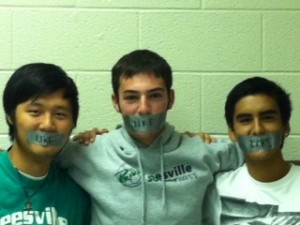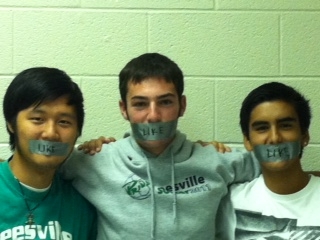
Walking down a hallway at any high school in North America, it would be impossible to not hear this word. Teenagers insert it into sentences like a fat girl eats cake: the more, the better. One particularly painful example I overheard was one girl telling another girl about her weekend. The conversation basically went like this.
“So he, like, definitely didn’t even like, show up.”
“He…like…stood you up?!”
“Yeah, I like, thought that only…like…happened in movies and stuff.”
First of all, no one can “like” not show up. Could he not make it so he sent a hologram of himself? Either he was there, or he was not. Not a single person, besides Sirius Black with his face in the fire, can “like” be anywhere. It is physically impossible.
The second thing that troubles me about this conversation is how the first girl “like” thought. Was she undermining what she actually thought, adding the word “like”, in order to soften the statement? Inserting this word, instead of saying “I thought that only happened in movies,” she says “I, like, thought that only like, happened in movies.” She did not think–she “like” thought.
Using the word “like” reduces the concrete meaning of the statement, reducing its effectiveness and its sureness about what she thought. It also implies that her thinking abilities are substandard because she “like” thinks. She doesn’t actually think.
I can see why the male subject of the conversation never showed up.
What is up with this? Have my peers arbitrarily become attached to similes and liking things?
No, they have not, because how the majority of my peers use the word “like” is not for a poetic comparison, nor to express contentment.
No, the word “like” is used nowadays for just, like, about everything.
“In North America, especially among young people, it’s common to use the word ‘like’ as a vocalized pause. It began with ‘Valley speak’ which is a stereotypical manner of speaking that originated in Southern California in the 70s,” commented wikiHow.com.
If “like” is simply a vocalized pause, then it is completely unnecessary. Our society is trained to avoid pauses as they are supposed to show a lack intelligence. In my opinion, a thoughtful pause sounds a million times more intelligent than a poorly placed “like.”
There is also the idea that was mentioned above: that “like” doing something is softer, less harsh, than actually doing something. Here is my problem with this example: why are we so scared of actually doing something? A concrete action is more effective at communicating an idea than a “like” concrete action. For teenagers, especially teenage girls, who love dramatic, over-embellished stories, it makes no sense that the most important actions are not actually done, they are “like” done. A sentence has more pop and pizazz when the action words are in entirety.
If this trend is going to continue, it is scary to think of the possibility of “like” being a window to a broader problem. Are we, as a society, scared of actually doing something? Do we mask this fear with, instead of doing something, “like” doing something? What are the repercussions of this habit when my peers and I enter the real world?
That is why this “like” problem is so, like, serious. Society today, especially with as many economical issues as we have, needs do-ers. Not “like” do-ers. The do-ers are the ones who will rise to the top. So be a do-er. Broaden your vocabulary to use only “like” when necessary and grammatically correct, not to soften a comment.
So go out and, like, conquer the world with your good vocabulary. But actually do it this time.

Leave a Reply